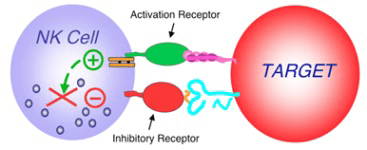Welcome to the French Lab!
Our research focuses on the interface between the host innate immune system and large double-stranded DNA viruses and how interactions at this interface may influence the initiation of inappropriate autoimmune responses in rheumatic diseases. We are particularly interested in natural killer (NK) cells — innate lymphocytes that play a critical role in early anti-pathogen host defense.

Patients with selective NK cell deficiencies uniformly have difficulty with large DNA viruses and murine resistance to two herpesviruses (MCMV and HSV-1), as well as to the poxvirus ectromelia which has been genetically mapped to the NK gene complex on mouse chromosome 6. Abnormalities in either NK cell numbers and/or function have also been identified in a number of autoimmune disorders such as rheumatoid arthritis, multiple sclerosis and systemic lupus erythematous.
Our laboratory is interested in three primary areas.
- Studying the mechanisms controlling viral-induced NK cell proliferation and homeostasis during herpesvirus and poxvirus infections
- Investigating patients with unusually recurrent or severe herpesvirus infections using cutting edge technologies including WES and CyTOF
- Delineating abnormal innate immune responses in the onset of autoimmunity using samples from treatment-naïve, new-onset patients with juvenile idiopathic arthritis and juvenile dermatomyositis

Principal Investigator
Anthony French, MD, PhD
Anthony R. French received his MD and PhD degrees from the University of Illinois at Urbana-Champaign. His graduate work was with Dr. Douglas Lauffenburger studying receptor-mediated endocytosis and intracellular sorting. He completed his residency in Pediatrics at the Mayo Clinic in Rochester, MN and his fellowship in Pediatric Rheumatology at Washington University School of Medicine in St. Louis, MO.
His clinical interests include juvenile rheumatoid arthritis, juvenile dermatomyositis, vasculitis, and pediatric SLE. His research is focused on the role of natural killer (NK) cells in the early innate immune response and is motivated by the hypothesis that a clearer understanding of in vivo NK cell responses and homeostasis may lead to novel therapeutic interventions in autoimmune diseases.